Effectiveness of CBT as Treatment for Obsessive-Compulsive Disorder
VerifiedAdded on 2023/06/08
|9
|2313
|158
Essay
AI Summary
This essay comprehensively examines the effectiveness of Cognitive Behavioral Therapy (CBT) as a treatment for Obsessive-Compulsive Disorder (OCD). It begins by outlining the foundational principles of CBT, including the interconnection between thoughts, feelings, and behaviors, and the importance of a strong therapeutic alliance. The essay then delves into the basic concepts of the therapy, emphasizing its goal-oriented nature and collaborative approach. It reviews key studies and research findings, including clinical trials and case studies, detailing participant numbers, duration of therapy, and specific techniques employed, such as cognitive rehearsal, validation testing, and modeling. The essay also addresses the impact of cultural beliefs on CBT and evaluates the outcomes of therapy, including symptom reduction, increased interaction, and improved self-esteem. Finally, it concludes by emphasizing the positive outcomes and the importance of tailoring CBT sessions to the specific type of OCD, highlighting CBT's effectiveness in treating OCD and improving the quality of life for individuals suffering from the disorder.
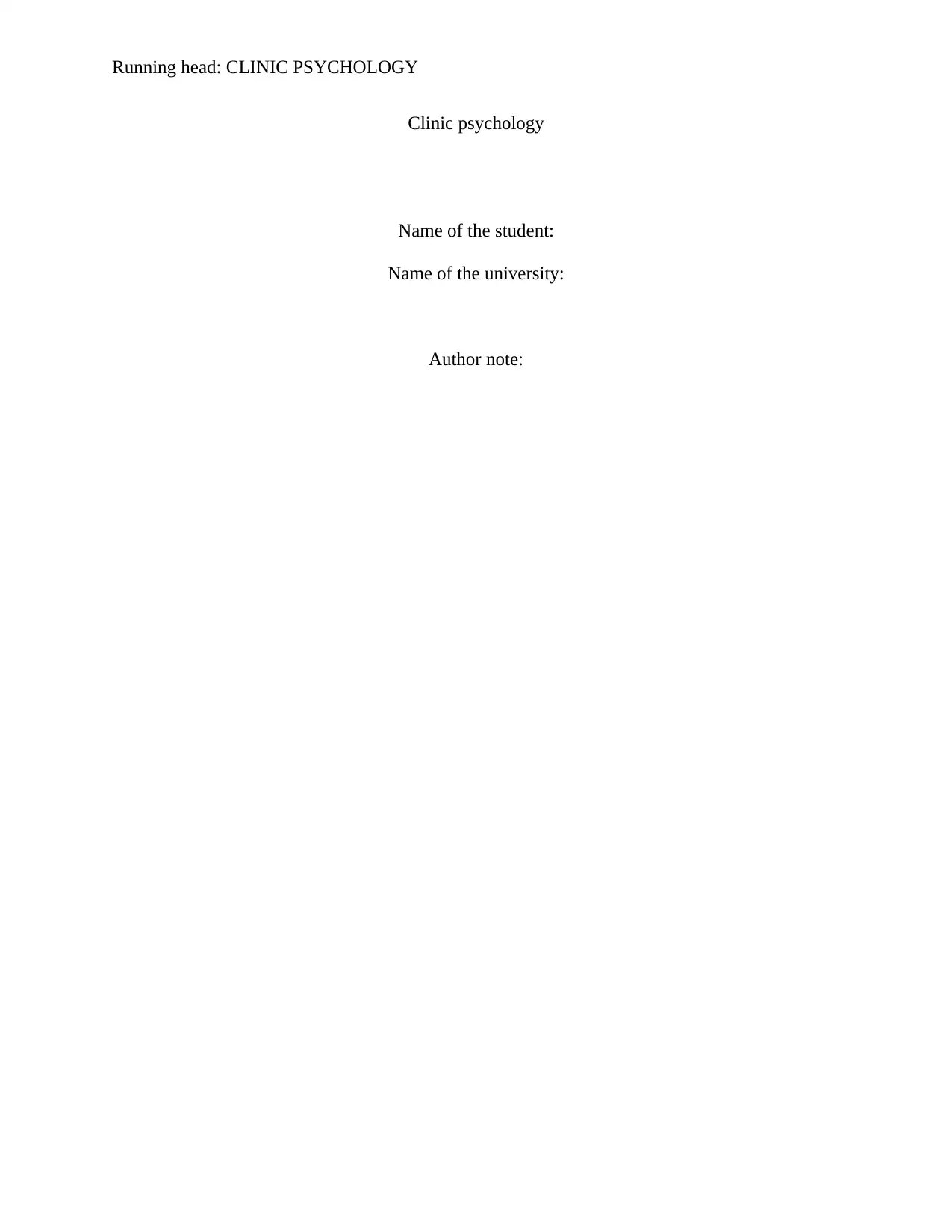
Running head: CLINIC PSYCHOLOGY
Clinic psychology
Name of the student:
Name of the university:
Author note:
Clinic psychology
Name of the student:
Name of the university:
Author note:
Paraphrase This Document
Need a fresh take? Get an instant paraphrase of this document with our AI Paraphraser
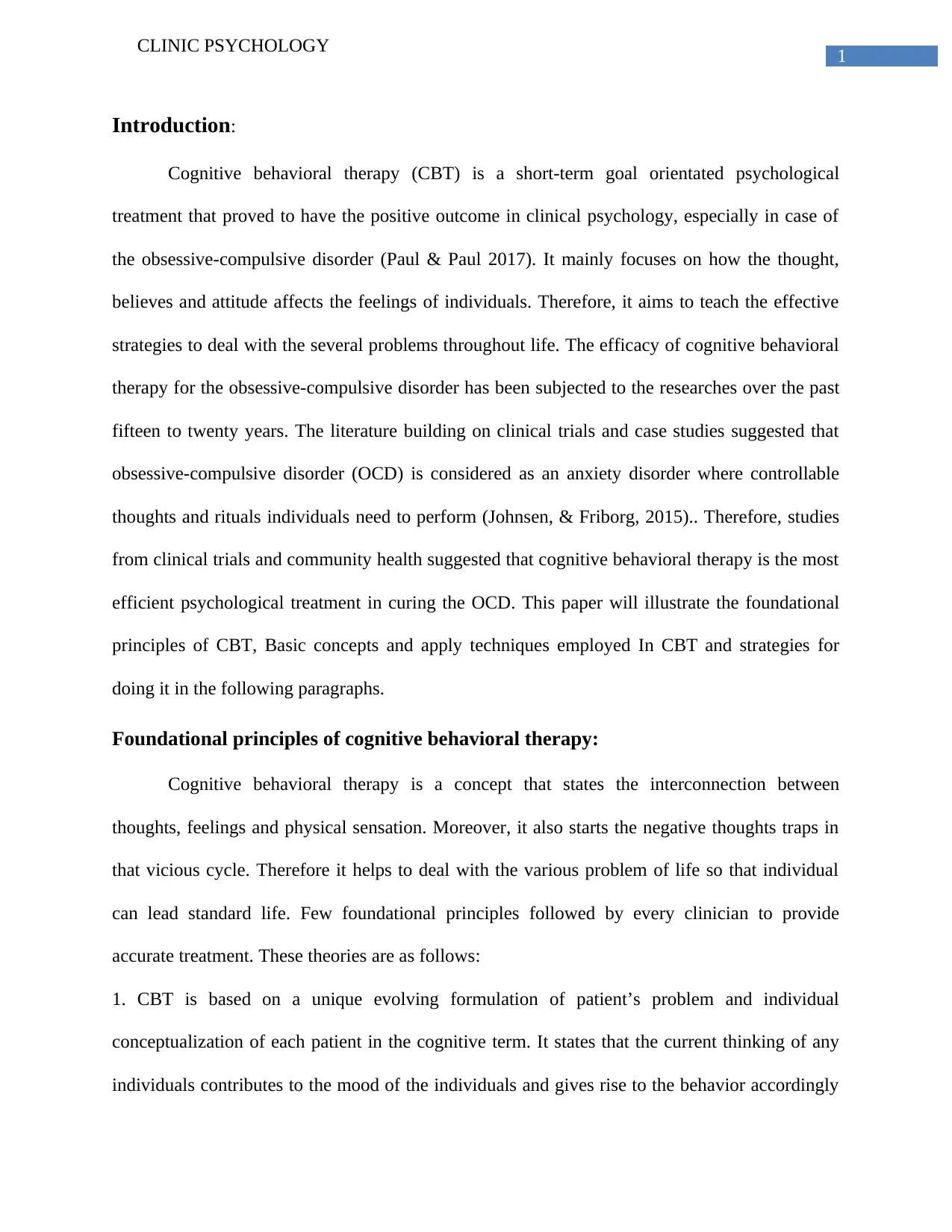
1
CLINIC PSYCHOLOGY
Introduction:
Cognitive behavioral therapy (CBT) is a short-term goal orientated psychological
treatment that proved to have the positive outcome in clinical psychology, especially in case of
the obsessive-compulsive disorder (Paul & Paul 2017). It mainly focuses on how the thought,
believes and attitude affects the feelings of individuals. Therefore, it aims to teach the effective
strategies to deal with the several problems throughout life. The efficacy of cognitive behavioral
therapy for the obsessive-compulsive disorder has been subjected to the researches over the past
fifteen to twenty years. The literature building on clinical trials and case studies suggested that
obsessive-compulsive disorder (OCD) is considered as an anxiety disorder where controllable
thoughts and rituals individuals need to perform (Johnsen, & Friborg, 2015).. Therefore, studies
from clinical trials and community health suggested that cognitive behavioral therapy is the most
efficient psychological treatment in curing the OCD. This paper will illustrate the foundational
principles of CBT, Basic concepts and apply techniques employed In CBT and strategies for
doing it in the following paragraphs.
Foundational principles of cognitive behavioral therapy:
Cognitive behavioral therapy is a concept that states the interconnection between
thoughts, feelings and physical sensation. Moreover, it also starts the negative thoughts traps in
that vicious cycle. Therefore it helps to deal with the various problem of life so that individual
can lead standard life. Few foundational principles followed by every clinician to provide
accurate treatment. These theories are as follows:
1. CBT is based on a unique evolving formulation of patient’s problem and individual
conceptualization of each patient in the cognitive term. It states that the current thinking of any
individuals contributes to the mood of the individuals and gives rise to the behavior accordingly
CLINIC PSYCHOLOGY
Introduction:
Cognitive behavioral therapy (CBT) is a short-term goal orientated psychological
treatment that proved to have the positive outcome in clinical psychology, especially in case of
the obsessive-compulsive disorder (Paul & Paul 2017). It mainly focuses on how the thought,
believes and attitude affects the feelings of individuals. Therefore, it aims to teach the effective
strategies to deal with the several problems throughout life. The efficacy of cognitive behavioral
therapy for the obsessive-compulsive disorder has been subjected to the researches over the past
fifteen to twenty years. The literature building on clinical trials and case studies suggested that
obsessive-compulsive disorder (OCD) is considered as an anxiety disorder where controllable
thoughts and rituals individuals need to perform (Johnsen, & Friborg, 2015).. Therefore, studies
from clinical trials and community health suggested that cognitive behavioral therapy is the most
efficient psychological treatment in curing the OCD. This paper will illustrate the foundational
principles of CBT, Basic concepts and apply techniques employed In CBT and strategies for
doing it in the following paragraphs.
Foundational principles of cognitive behavioral therapy:
Cognitive behavioral therapy is a concept that states the interconnection between
thoughts, feelings and physical sensation. Moreover, it also starts the negative thoughts traps in
that vicious cycle. Therefore it helps to deal with the various problem of life so that individual
can lead standard life. Few foundational principles followed by every clinician to provide
accurate treatment. These theories are as follows:
1. CBT is based on a unique evolving formulation of patient’s problem and individual
conceptualization of each patient in the cognitive term. It states that the current thinking of any
individuals contributes to the mood of the individuals and gives rise to the behavior accordingly
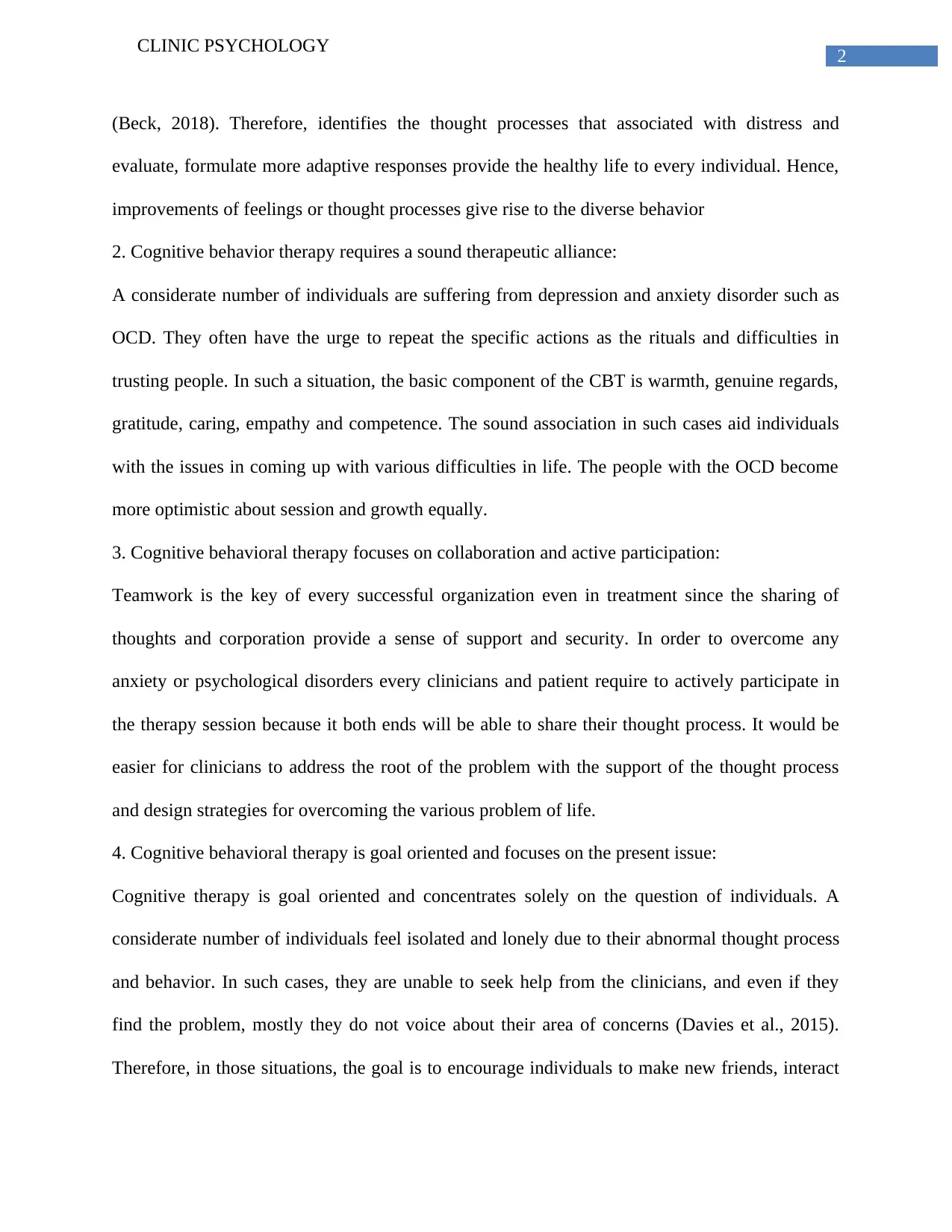
2
CLINIC PSYCHOLOGY
(Beck, 2018). Therefore, identifies the thought processes that associated with distress and
evaluate, formulate more adaptive responses provide the healthy life to every individual. Hence,
improvements of feelings or thought processes give rise to the diverse behavior
2. Cognitive behavior therapy requires a sound therapeutic alliance:
A considerate number of individuals are suffering from depression and anxiety disorder such as
OCD. They often have the urge to repeat the specific actions as the rituals and difficulties in
trusting people. In such a situation, the basic component of the CBT is warmth, genuine regards,
gratitude, caring, empathy and competence. The sound association in such cases aid individuals
with the issues in coming up with various difficulties in life. The people with the OCD become
more optimistic about session and growth equally.
3. Cognitive behavioral therapy focuses on collaboration and active participation:
Teamwork is the key of every successful organization even in treatment since the sharing of
thoughts and corporation provide a sense of support and security. In order to overcome any
anxiety or psychological disorders every clinicians and patient require to actively participate in
the therapy session because it both ends will be able to share their thought process. It would be
easier for clinicians to address the root of the problem with the support of the thought process
and design strategies for overcoming the various problem of life.
4. Cognitive behavioral therapy is goal oriented and focuses on the present issue:
Cognitive therapy is goal oriented and concentrates solely on the question of individuals. A
considerate number of individuals feel isolated and lonely due to their abnormal thought process
and behavior. In such cases, they are unable to seek help from the clinicians, and even if they
find the problem, mostly they do not voice about their area of concerns (Davies et al., 2015).
Therefore, in those situations, the goal is to encourage individuals to make new friends, interact
CLINIC PSYCHOLOGY
(Beck, 2018). Therefore, identifies the thought processes that associated with distress and
evaluate, formulate more adaptive responses provide the healthy life to every individual. Hence,
improvements of feelings or thought processes give rise to the diverse behavior
2. Cognitive behavior therapy requires a sound therapeutic alliance:
A considerate number of individuals are suffering from depression and anxiety disorder such as
OCD. They often have the urge to repeat the specific actions as the rituals and difficulties in
trusting people. In such a situation, the basic component of the CBT is warmth, genuine regards,
gratitude, caring, empathy and competence. The sound association in such cases aid individuals
with the issues in coming up with various difficulties in life. The people with the OCD become
more optimistic about session and growth equally.
3. Cognitive behavioral therapy focuses on collaboration and active participation:
Teamwork is the key of every successful organization even in treatment since the sharing of
thoughts and corporation provide a sense of support and security. In order to overcome any
anxiety or psychological disorders every clinicians and patient require to actively participate in
the therapy session because it both ends will be able to share their thought process. It would be
easier for clinicians to address the root of the problem with the support of the thought process
and design strategies for overcoming the various problem of life.
4. Cognitive behavioral therapy is goal oriented and focuses on the present issue:
Cognitive therapy is goal oriented and concentrates solely on the question of individuals. A
considerate number of individuals feel isolated and lonely due to their abnormal thought process
and behavior. In such cases, they are unable to seek help from the clinicians, and even if they
find the problem, mostly they do not voice about their area of concerns (Davies et al., 2015).
Therefore, in those situations, the goal is to encourage individuals to make new friends, interact
⊘ This is a preview!⊘
Do you want full access?
Subscribe today to unlock all pages.

Trusted by 1+ million students worldwide
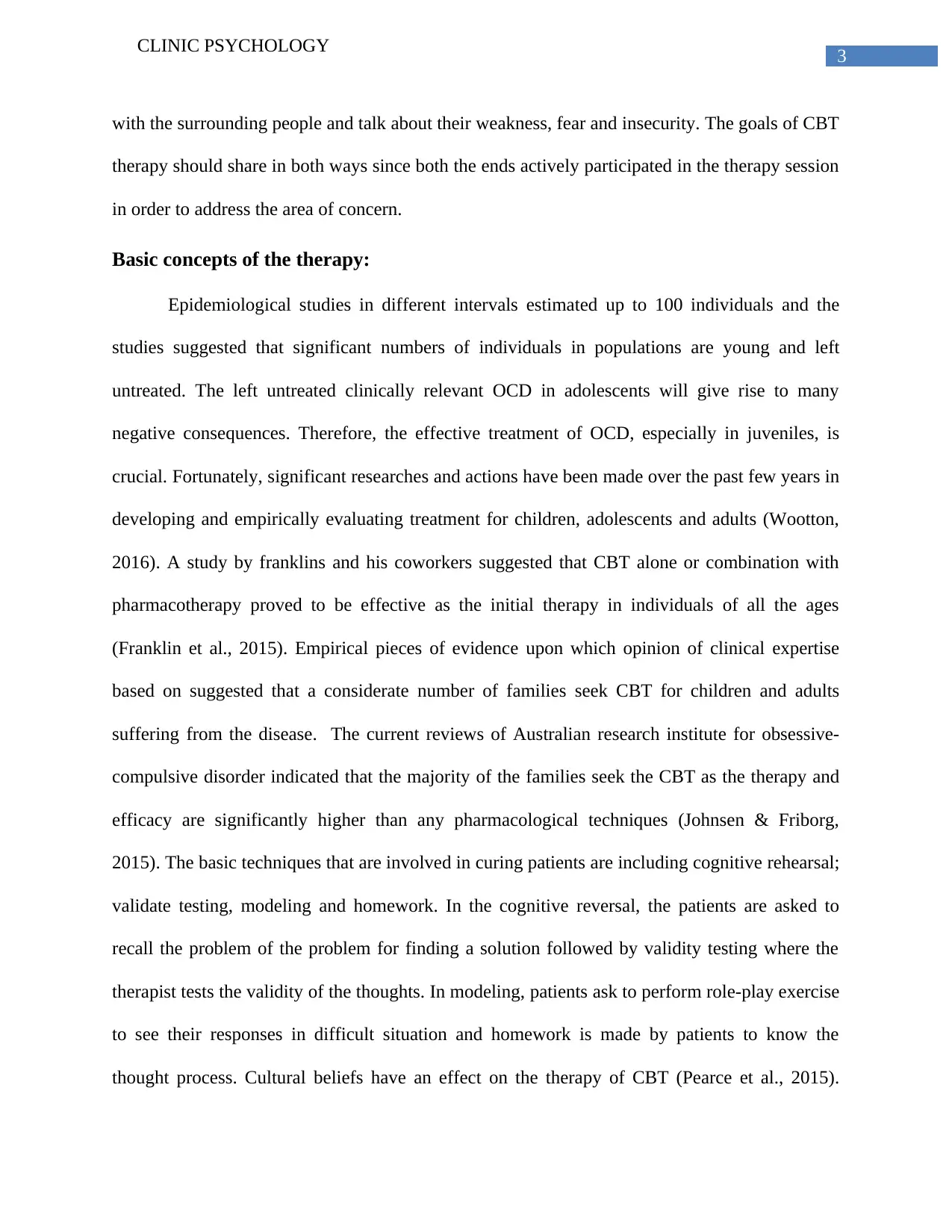
3
CLINIC PSYCHOLOGY
with the surrounding people and talk about their weakness, fear and insecurity. The goals of CBT
therapy should share in both ways since both the ends actively participated in the therapy session
in order to address the area of concern.
Basic concepts of the therapy:
Epidemiological studies in different intervals estimated up to 100 individuals and the
studies suggested that significant numbers of individuals in populations are young and left
untreated. The left untreated clinically relevant OCD in adolescents will give rise to many
negative consequences. Therefore, the effective treatment of OCD, especially in juveniles, is
crucial. Fortunately, significant researches and actions have been made over the past few years in
developing and empirically evaluating treatment for children, adolescents and adults (Wootton,
2016). A study by franklins and his coworkers suggested that CBT alone or combination with
pharmacotherapy proved to be effective as the initial therapy in individuals of all the ages
(Franklin et al., 2015). Empirical pieces of evidence upon which opinion of clinical expertise
based on suggested that a considerate number of families seek CBT for children and adults
suffering from the disease. The current reviews of Australian research institute for obsessive-
compulsive disorder indicated that the majority of the families seek the CBT as the therapy and
efficacy are significantly higher than any pharmacological techniques (Johnsen & Friborg,
2015). The basic techniques that are involved in curing patients are including cognitive rehearsal;
validate testing, modeling and homework. In the cognitive reversal, the patients are asked to
recall the problem of the problem for finding a solution followed by validity testing where the
therapist tests the validity of the thoughts. In modeling, patients ask to perform role-play exercise
to see their responses in difficult situation and homework is made by patients to know the
thought process. Cultural beliefs have an effect on the therapy of CBT (Pearce et al., 2015).
CLINIC PSYCHOLOGY
with the surrounding people and talk about their weakness, fear and insecurity. The goals of CBT
therapy should share in both ways since both the ends actively participated in the therapy session
in order to address the area of concern.
Basic concepts of the therapy:
Epidemiological studies in different intervals estimated up to 100 individuals and the
studies suggested that significant numbers of individuals in populations are young and left
untreated. The left untreated clinically relevant OCD in adolescents will give rise to many
negative consequences. Therefore, the effective treatment of OCD, especially in juveniles, is
crucial. Fortunately, significant researches and actions have been made over the past few years in
developing and empirically evaluating treatment for children, adolescents and adults (Wootton,
2016). A study by franklins and his coworkers suggested that CBT alone or combination with
pharmacotherapy proved to be effective as the initial therapy in individuals of all the ages
(Franklin et al., 2015). Empirical pieces of evidence upon which opinion of clinical expertise
based on suggested that a considerate number of families seek CBT for children and adults
suffering from the disease. The current reviews of Australian research institute for obsessive-
compulsive disorder indicated that the majority of the families seek the CBT as the therapy and
efficacy are significantly higher than any pharmacological techniques (Johnsen & Friborg,
2015). The basic techniques that are involved in curing patients are including cognitive rehearsal;
validate testing, modeling and homework. In the cognitive reversal, the patients are asked to
recall the problem of the problem for finding a solution followed by validity testing where the
therapist tests the validity of the thoughts. In modeling, patients ask to perform role-play exercise
to see their responses in difficult situation and homework is made by patients to know the
thought process. Cultural beliefs have an effect on the therapy of CBT (Pearce et al., 2015).
Paraphrase This Document
Need a fresh take? Get an instant paraphrase of this document with our AI Paraphraser
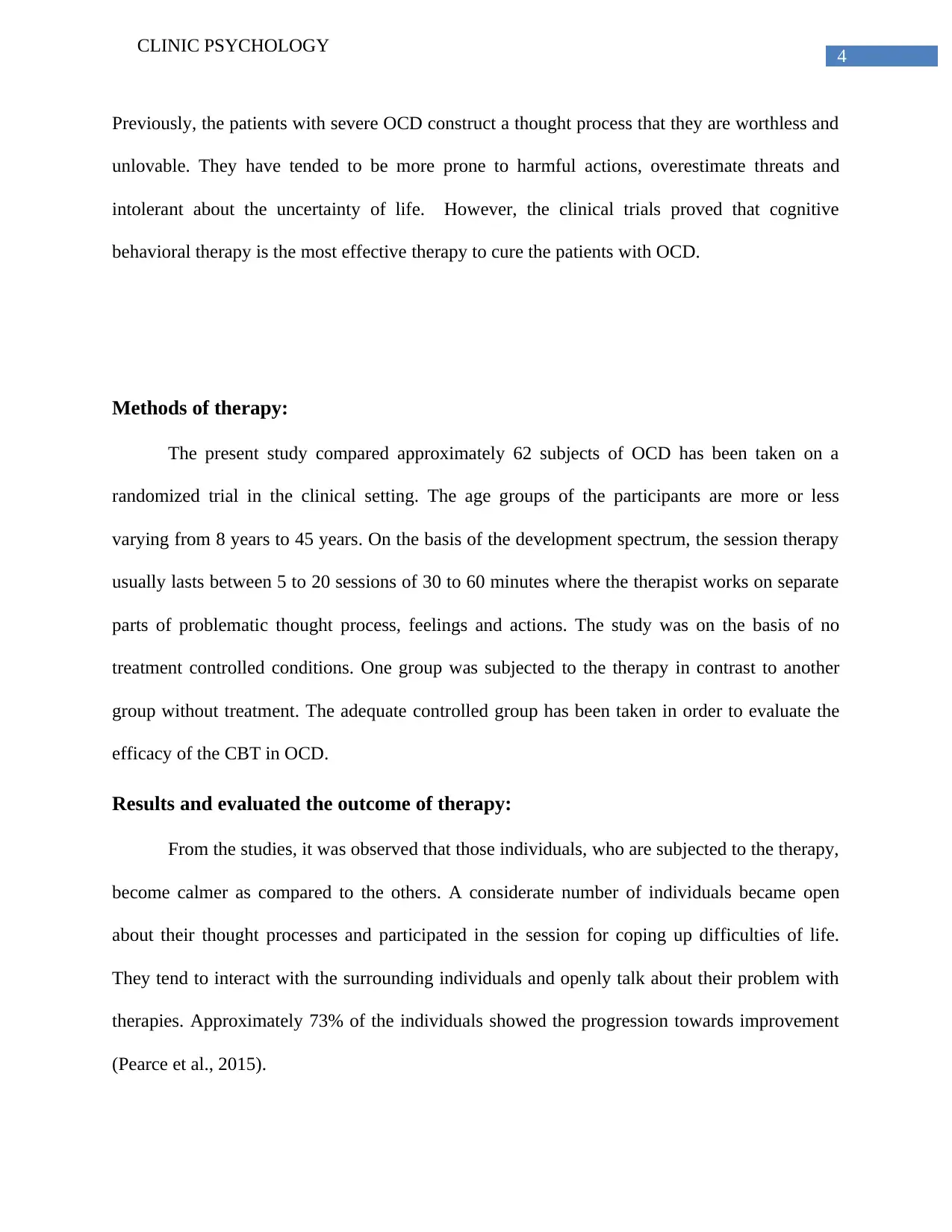
4
CLINIC PSYCHOLOGY
Previously, the patients with severe OCD construct a thought process that they are worthless and
unlovable. They have tended to be more prone to harmful actions, overestimate threats and
intolerant about the uncertainty of life. However, the clinical trials proved that cognitive
behavioral therapy is the most effective therapy to cure the patients with OCD.
Methods of therapy:
The present study compared approximately 62 subjects of OCD has been taken on a
randomized trial in the clinical setting. The age groups of the participants are more or less
varying from 8 years to 45 years. On the basis of the development spectrum, the session therapy
usually lasts between 5 to 20 sessions of 30 to 60 minutes where the therapist works on separate
parts of problematic thought process, feelings and actions. The study was on the basis of no
treatment controlled conditions. One group was subjected to the therapy in contrast to another
group without treatment. The adequate controlled group has been taken in order to evaluate the
efficacy of the CBT in OCD.
Results and evaluated the outcome of therapy:
From the studies, it was observed that those individuals, who are subjected to the therapy,
become calmer as compared to the others. A considerate number of individuals became open
about their thought processes and participated in the session for coping up difficulties of life.
They tend to interact with the surrounding individuals and openly talk about their problem with
therapies. Approximately 73% of the individuals showed the progression towards improvement
(Pearce et al., 2015).
CLINIC PSYCHOLOGY
Previously, the patients with severe OCD construct a thought process that they are worthless and
unlovable. They have tended to be more prone to harmful actions, overestimate threats and
intolerant about the uncertainty of life. However, the clinical trials proved that cognitive
behavioral therapy is the most effective therapy to cure the patients with OCD.
Methods of therapy:
The present study compared approximately 62 subjects of OCD has been taken on a
randomized trial in the clinical setting. The age groups of the participants are more or less
varying from 8 years to 45 years. On the basis of the development spectrum, the session therapy
usually lasts between 5 to 20 sessions of 30 to 60 minutes where the therapist works on separate
parts of problematic thought process, feelings and actions. The study was on the basis of no
treatment controlled conditions. One group was subjected to the therapy in contrast to another
group without treatment. The adequate controlled group has been taken in order to evaluate the
efficacy of the CBT in OCD.
Results and evaluated the outcome of therapy:
From the studies, it was observed that those individuals, who are subjected to the therapy,
become calmer as compared to the others. A considerate number of individuals became open
about their thought processes and participated in the session for coping up difficulties of life.
They tend to interact with the surrounding individuals and openly talk about their problem with
therapies. Approximately 73% of the individuals showed the progression towards improvement
(Pearce et al., 2015).
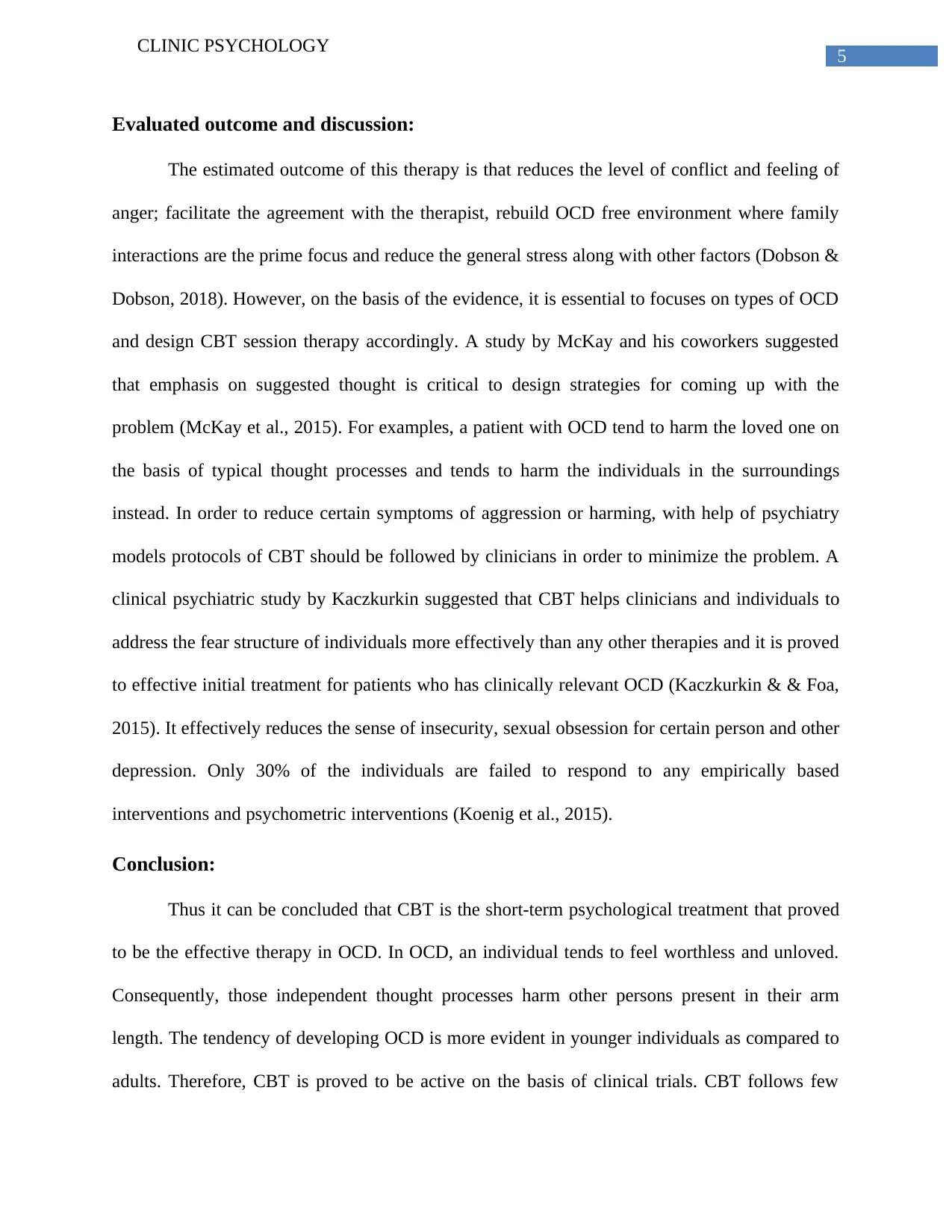
5
CLINIC PSYCHOLOGY
Evaluated outcome and discussion:
The estimated outcome of this therapy is that reduces the level of conflict and feeling of
anger; facilitate the agreement with the therapist, rebuild OCD free environment where family
interactions are the prime focus and reduce the general stress along with other factors (Dobson &
Dobson, 2018). However, on the basis of the evidence, it is essential to focuses on types of OCD
and design CBT session therapy accordingly. A study by McKay and his coworkers suggested
that emphasis on suggested thought is critical to design strategies for coming up with the
problem (McKay et al., 2015). For examples, a patient with OCD tend to harm the loved one on
the basis of typical thought processes and tends to harm the individuals in the surroundings
instead. In order to reduce certain symptoms of aggression or harming, with help of psychiatry
models protocols of CBT should be followed by clinicians in order to minimize the problem. A
clinical psychiatric study by Kaczkurkin suggested that CBT helps clinicians and individuals to
address the fear structure of individuals more effectively than any other therapies and it is proved
to effective initial treatment for patients who has clinically relevant OCD (Kaczkurkin & & Foa,
2015). It effectively reduces the sense of insecurity, sexual obsession for certain person and other
depression. Only 30% of the individuals are failed to respond to any empirically based
interventions and psychometric interventions (Koenig et al., 2015).
Conclusion:
Thus it can be concluded that CBT is the short-term psychological treatment that proved
to be the effective therapy in OCD. In OCD, an individual tends to feel worthless and unloved.
Consequently, those independent thought processes harm other persons present in their arm
length. The tendency of developing OCD is more evident in younger individuals as compared to
adults. Therefore, CBT is proved to be active on the basis of clinical trials. CBT follows few
CLINIC PSYCHOLOGY
Evaluated outcome and discussion:
The estimated outcome of this therapy is that reduces the level of conflict and feeling of
anger; facilitate the agreement with the therapist, rebuild OCD free environment where family
interactions are the prime focus and reduce the general stress along with other factors (Dobson &
Dobson, 2018). However, on the basis of the evidence, it is essential to focuses on types of OCD
and design CBT session therapy accordingly. A study by McKay and his coworkers suggested
that emphasis on suggested thought is critical to design strategies for coming up with the
problem (McKay et al., 2015). For examples, a patient with OCD tend to harm the loved one on
the basis of typical thought processes and tends to harm the individuals in the surroundings
instead. In order to reduce certain symptoms of aggression or harming, with help of psychiatry
models protocols of CBT should be followed by clinicians in order to minimize the problem. A
clinical psychiatric study by Kaczkurkin suggested that CBT helps clinicians and individuals to
address the fear structure of individuals more effectively than any other therapies and it is proved
to effective initial treatment for patients who has clinically relevant OCD (Kaczkurkin & & Foa,
2015). It effectively reduces the sense of insecurity, sexual obsession for certain person and other
depression. Only 30% of the individuals are failed to respond to any empirically based
interventions and psychometric interventions (Koenig et al., 2015).
Conclusion:
Thus it can be concluded that CBT is the short-term psychological treatment that proved
to be the effective therapy in OCD. In OCD, an individual tends to feel worthless and unloved.
Consequently, those independent thought processes harm other persons present in their arm
length. The tendency of developing OCD is more evident in younger individuals as compared to
adults. Therefore, CBT is proved to be active on the basis of clinical trials. CBT follows few
⊘ This is a preview!⊘
Do you want full access?
Subscribe today to unlock all pages.

Trusted by 1+ million students worldwide
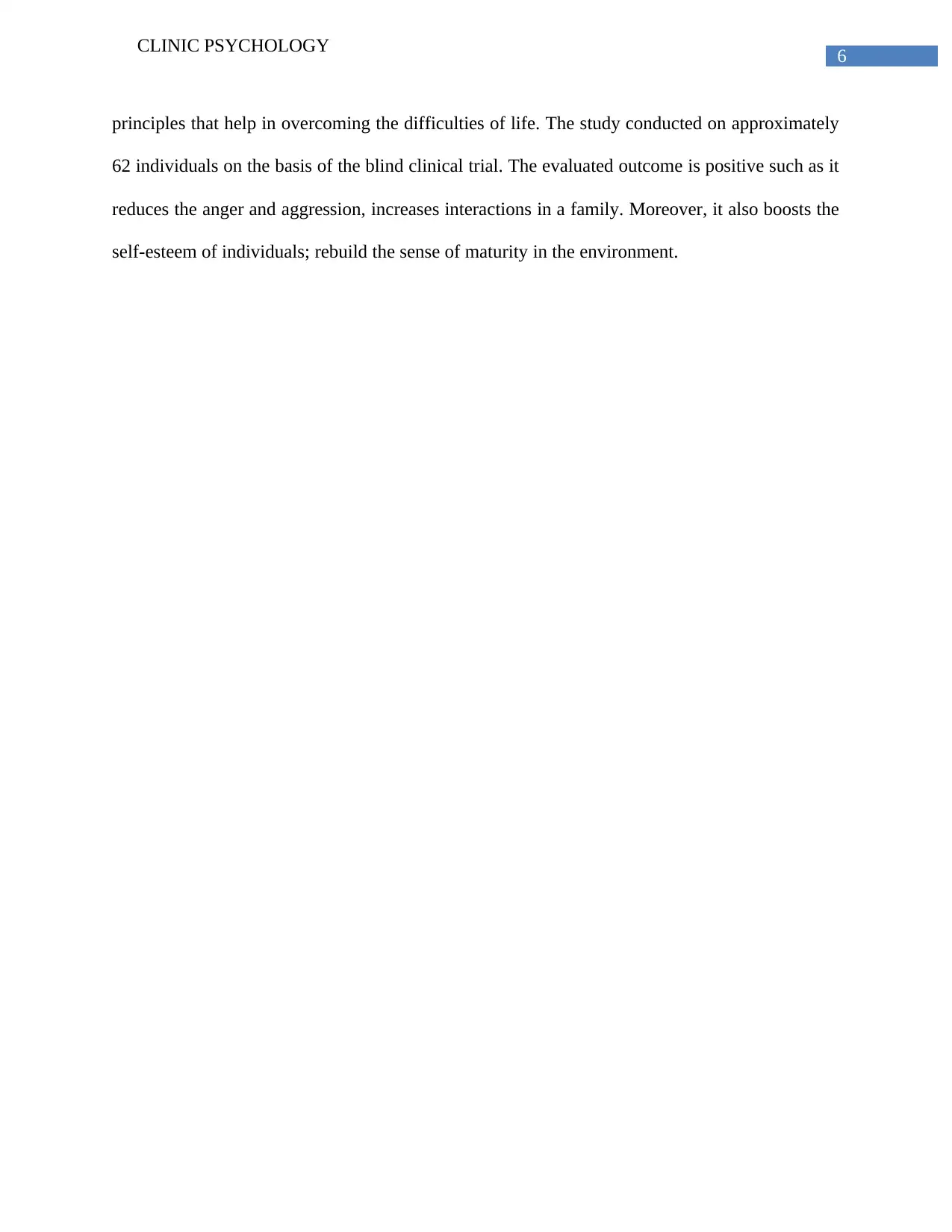
6
CLINIC PSYCHOLOGY
principles that help in overcoming the difficulties of life. The study conducted on approximately
62 individuals on the basis of the blind clinical trial. The evaluated outcome is positive such as it
reduces the anger and aggression, increases interactions in a family. Moreover, it also boosts the
self-esteem of individuals; rebuild the sense of maturity in the environment.
CLINIC PSYCHOLOGY
principles that help in overcoming the difficulties of life. The study conducted on approximately
62 individuals on the basis of the blind clinical trial. The evaluated outcome is positive such as it
reduces the anger and aggression, increases interactions in a family. Moreover, it also boosts the
self-esteem of individuals; rebuild the sense of maturity in the environment.
Paraphrase This Document
Need a fresh take? Get an instant paraphrase of this document with our AI Paraphraser
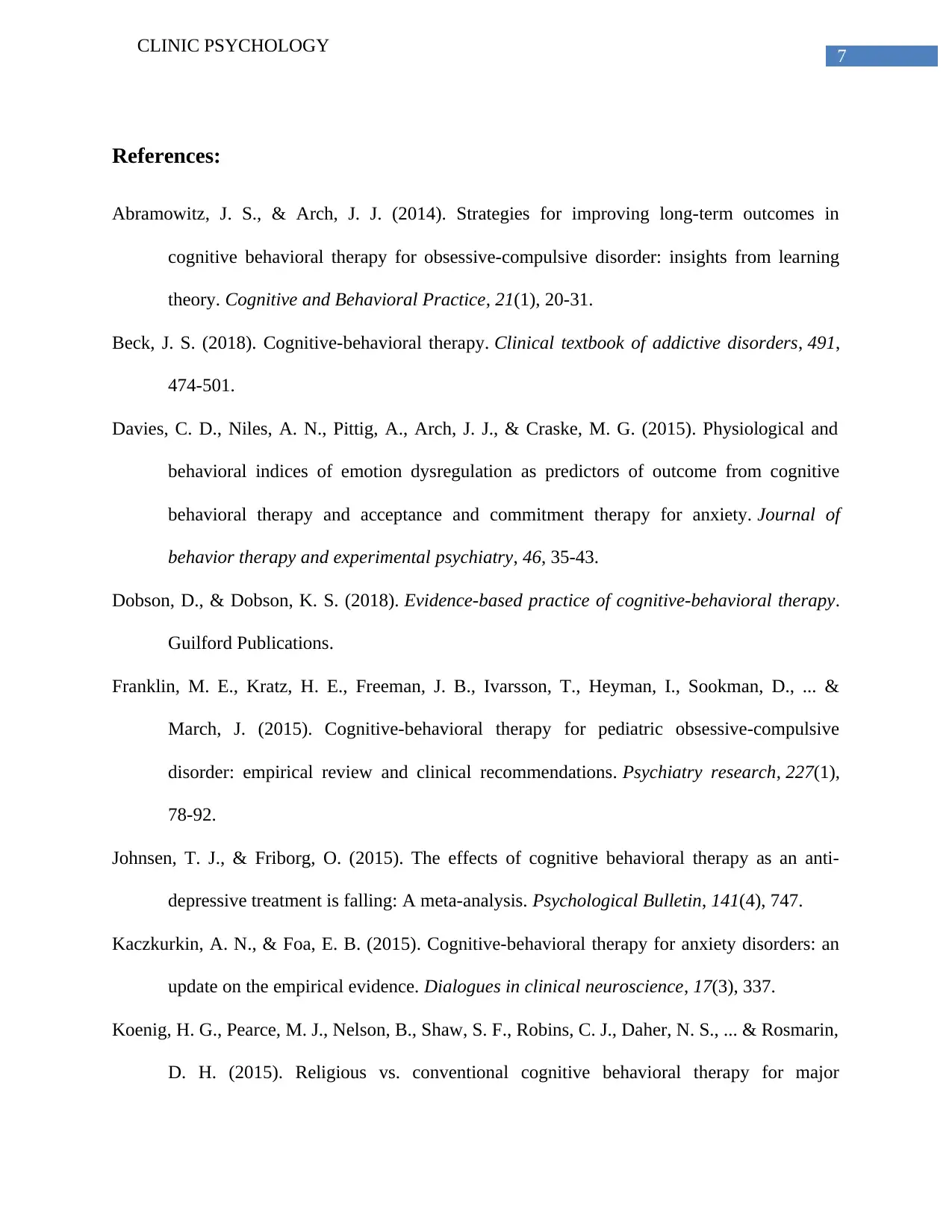
7
CLINIC PSYCHOLOGY
References:
Abramowitz, J. S., & Arch, J. J. (2014). Strategies for improving long-term outcomes in
cognitive behavioral therapy for obsessive-compulsive disorder: insights from learning
theory. Cognitive and Behavioral Practice, 21(1), 20-31.
Beck, J. S. (2018). Cognitive-behavioral therapy. Clinical textbook of addictive disorders, 491,
474-501.
Davies, C. D., Niles, A. N., Pittig, A., Arch, J. J., & Craske, M. G. (2015). Physiological and
behavioral indices of emotion dysregulation as predictors of outcome from cognitive
behavioral therapy and acceptance and commitment therapy for anxiety. Journal of
behavior therapy and experimental psychiatry, 46, 35-43.
Dobson, D., & Dobson, K. S. (2018). Evidence-based practice of cognitive-behavioral therapy.
Guilford Publications.
Franklin, M. E., Kratz, H. E., Freeman, J. B., Ivarsson, T., Heyman, I., Sookman, D., ... &
March, J. (2015). Cognitive-behavioral therapy for pediatric obsessive-compulsive
disorder: empirical review and clinical recommendations. Psychiatry research, 227(1),
78-92.
Johnsen, T. J., & Friborg, O. (2015). The effects of cognitive behavioral therapy as an anti-
depressive treatment is falling: A meta-analysis. Psychological Bulletin, 141(4), 747.
Kaczkurkin, A. N., & Foa, E. B. (2015). Cognitive-behavioral therapy for anxiety disorders: an
update on the empirical evidence. Dialogues in clinical neuroscience, 17(3), 337.
Koenig, H. G., Pearce, M. J., Nelson, B., Shaw, S. F., Robins, C. J., Daher, N. S., ... & Rosmarin,
D. H. (2015). Religious vs. conventional cognitive behavioral therapy for major
CLINIC PSYCHOLOGY
References:
Abramowitz, J. S., & Arch, J. J. (2014). Strategies for improving long-term outcomes in
cognitive behavioral therapy for obsessive-compulsive disorder: insights from learning
theory. Cognitive and Behavioral Practice, 21(1), 20-31.
Beck, J. S. (2018). Cognitive-behavioral therapy. Clinical textbook of addictive disorders, 491,
474-501.
Davies, C. D., Niles, A. N., Pittig, A., Arch, J. J., & Craske, M. G. (2015). Physiological and
behavioral indices of emotion dysregulation as predictors of outcome from cognitive
behavioral therapy and acceptance and commitment therapy for anxiety. Journal of
behavior therapy and experimental psychiatry, 46, 35-43.
Dobson, D., & Dobson, K. S. (2018). Evidence-based practice of cognitive-behavioral therapy.
Guilford Publications.
Franklin, M. E., Kratz, H. E., Freeman, J. B., Ivarsson, T., Heyman, I., Sookman, D., ... &
March, J. (2015). Cognitive-behavioral therapy for pediatric obsessive-compulsive
disorder: empirical review and clinical recommendations. Psychiatry research, 227(1),
78-92.
Johnsen, T. J., & Friborg, O. (2015). The effects of cognitive behavioral therapy as an anti-
depressive treatment is falling: A meta-analysis. Psychological Bulletin, 141(4), 747.
Kaczkurkin, A. N., & Foa, E. B. (2015). Cognitive-behavioral therapy for anxiety disorders: an
update on the empirical evidence. Dialogues in clinical neuroscience, 17(3), 337.
Koenig, H. G., Pearce, M. J., Nelson, B., Shaw, S. F., Robins, C. J., Daher, N. S., ... & Rosmarin,
D. H. (2015). Religious vs. conventional cognitive behavioral therapy for major
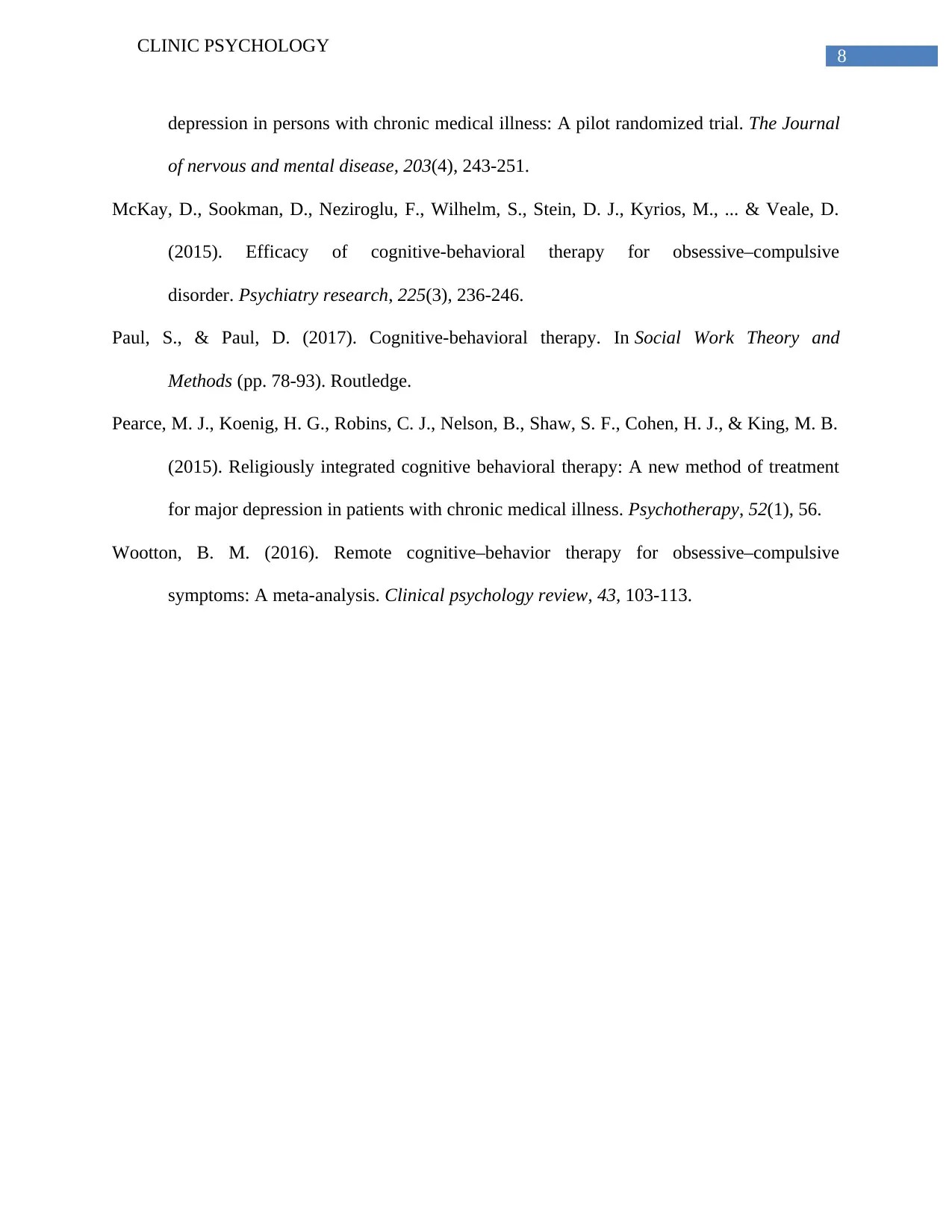
8
CLINIC PSYCHOLOGY
depression in persons with chronic medical illness: A pilot randomized trial. The Journal
of nervous and mental disease, 203(4), 243-251.
McKay, D., Sookman, D., Neziroglu, F., Wilhelm, S., Stein, D. J., Kyrios, M., ... & Veale, D.
(2015). Efficacy of cognitive-behavioral therapy for obsessive–compulsive
disorder. Psychiatry research, 225(3), 236-246.
Paul, S., & Paul, D. (2017). Cognitive-behavioral therapy. In Social Work Theory and
Methods (pp. 78-93). Routledge.
Pearce, M. J., Koenig, H. G., Robins, C. J., Nelson, B., Shaw, S. F., Cohen, H. J., & King, M. B.
(2015). Religiously integrated cognitive behavioral therapy: A new method of treatment
for major depression in patients with chronic medical illness. Psychotherapy, 52(1), 56.
Wootton, B. M. (2016). Remote cognitive–behavior therapy for obsessive–compulsive
symptoms: A meta-analysis. Clinical psychology review, 43, 103-113.
CLINIC PSYCHOLOGY
depression in persons with chronic medical illness: A pilot randomized trial. The Journal
of nervous and mental disease, 203(4), 243-251.
McKay, D., Sookman, D., Neziroglu, F., Wilhelm, S., Stein, D. J., Kyrios, M., ... & Veale, D.
(2015). Efficacy of cognitive-behavioral therapy for obsessive–compulsive
disorder. Psychiatry research, 225(3), 236-246.
Paul, S., & Paul, D. (2017). Cognitive-behavioral therapy. In Social Work Theory and
Methods (pp. 78-93). Routledge.
Pearce, M. J., Koenig, H. G., Robins, C. J., Nelson, B., Shaw, S. F., Cohen, H. J., & King, M. B.
(2015). Religiously integrated cognitive behavioral therapy: A new method of treatment
for major depression in patients with chronic medical illness. Psychotherapy, 52(1), 56.
Wootton, B. M. (2016). Remote cognitive–behavior therapy for obsessive–compulsive
symptoms: A meta-analysis. Clinical psychology review, 43, 103-113.
⊘ This is a preview!⊘
Do you want full access?
Subscribe today to unlock all pages.

Trusted by 1+ million students worldwide
1 out of 9
Related Documents
Your All-in-One AI-Powered Toolkit for Academic Success.
+13062052269
info@desklib.com
Available 24*7 on WhatsApp / Email
![[object Object]](/_next/static/media/star-bottom.7253800d.svg)
Unlock your academic potential
Copyright © 2020–2026 A2Z Services. All Rights Reserved. Developed and managed by ZUCOL.





